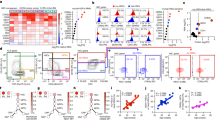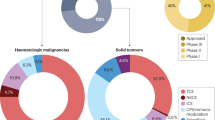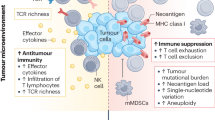Abstract
Within the registry of the chronic leukaemia working party of the European Group for Blood and Marrow Transplantation, data were available from 103 patients with chronic myeloid leukaemia who were treated by bone marrow transplantation from haploidentical family members. The patients of median age 30 years were transplanted between 1983 and 1994 in 25 European centres. The overall probabilities of survival and leukaemia-free survival (LFS) at 5 years were 32 and 25%, respectively. In univariate analysis, two factors were identified which affected survival and LFS, ie the state of disease at the time of transplant and the degree of HLA disparity. Fifty-nine patients were transplanted in first chronic phase and the probability of survival at 2 years was 47%. Forty-four patients received their transplants for advanced disease and their probability of survival at 2 years was 25% (P = 0.004). Donor bone marrow was HLA-mismatched for 0–1 antigens in 54 patients (group 1) and for 2–3 antigens in 49 patients (group 2). At 2 years, the probabilities of survival for groups 1 and 2 were 46 and 27% (P < 0.02) and the probabilities of lfs were 43 and 24% (p < 0.03), respectively. multivariate analysis confirmed the prognostic importance of the disease stage and of the hla disparity. patients transplanted in first chronic phase from a donor mismatched for 0–1 hla antigens had a probability of survival of 52% at 2 years compared with 19% for patients transplanted in advanced disease stage from donors mismatched for 2–3 hla antigens.
This is a preview of subscription content, access via your institution
Access options
Subscribe to this journal
Receive 12 print issues and online access
$259.00 per year
only $21.58 per issue
Buy this article
- Purchase on Springer Link
- Instant access to full article PDF
Prices may be subject to local taxes which are calculated during checkout
Similar content being viewed by others
Author information
Authors and Affiliations
Rights and permissions
About this article
Cite this article
Speiser, D., Hermans, J., van Biezen, A. et al. Haploidentical family member transplants for patients with chronic myeloid leukaemia: a report of the Chronic Leukaemia Working Party of the European Group for Blood and Marrow Transplantation (EBMT). Bone Marrow Transplant 19, 1197–1203 (1997). https://doi.org/10.1038/sj.bmt.1700792
Received:
Accepted:
Issue Date:
DOI: https://doi.org/10.1038/sj.bmt.1700792
Keywords
This article is cited by
-
Innovative approaches of targeted therapy for CML of childhood in combination with paediatric haematopoietic SCT
Bone Marrow Transplantation (2008)
-
Effective donor lymphohematopoietic reconstitution after haploidentical CD34+-selected hematopoietic stem cell transplantation in children with refractory severe aplastic anemia
Bone Marrow Transplantation (2004)
-
Partially matched related donor peripheral blood progenitor cell transplantation in paediatric patients adding fludarabine and anti-lymphocyte gamma-globulin
Bone Marrow Transplantation (2002)
-
Increased stem cell dose, as obtained using currently available technology, may not be sufficient for engraftment of haploidentical stem cell transplants
Bone Marrow Transplantation (2000)



